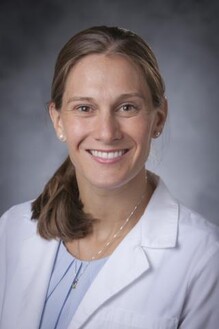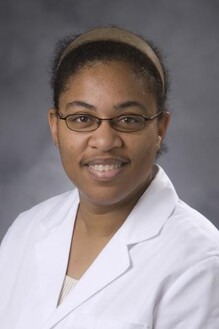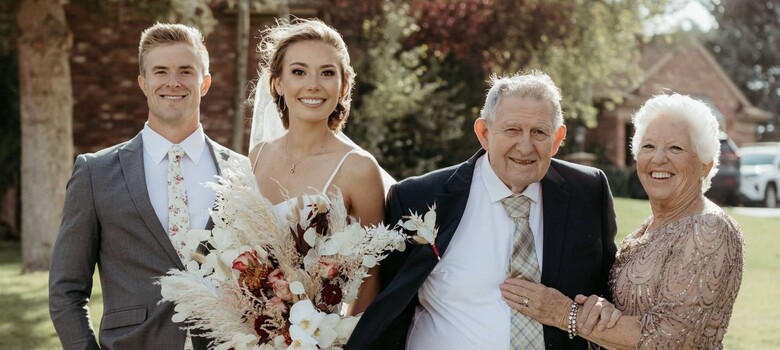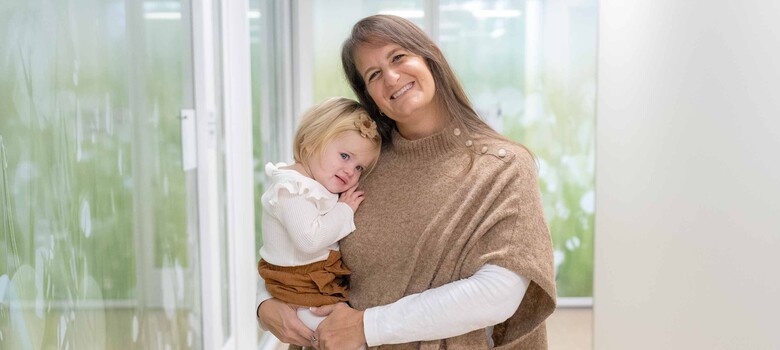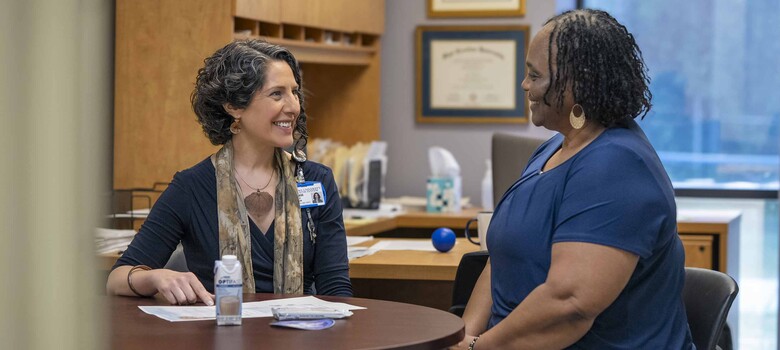Social Media Helps Woman Find Phyllodes Tumor Experts and Support
When Nathalie Delpeche was diagnosed with a recurrent phyllodes tumor, she turned to social media for information. There, she learned about Laura H. Rosenberger, MD, a breast surgical oncologist at Duke Health, and one of the nation’s leading experts in this rare tumor that grows in the breast. A few clicks later, Delpeche connected with a phyllodes tumor survivor in Durham who is also Dr. Rosenberger’s patient. Those connections convinced Delpeche to travel from her home in Brooklyn to receive her care at Duke. “I’m in the right place,” she said. “It’s worth the travel every three weeks.”
Aggressive Phyllodes Tumor Returns After Mastectomy
Delpeche, now 47, felt a lump in her breast in May 2023 but didn’t think much of it because she just had a mammogram. By July, the lump had grown significantly. Imaging and biopsy results confirmed it was a malignant phyllodes tumor. Delpeche had a mastectomy in New York in August.
Because few studies have evaluated chemotherapy for phyllodes tumors, there is no consensus on treatment or follow-up care after surgery for phyllodes tumors. Like many people with malignant phyllodes tumors, Delpeche received conflicting opinions from her doctors about what to do next. She chose to undergo ctDNA testing every three months. The ct in the test name stands for circulating tumor. The test looks for unique DNA fragments from the original cancer circulating in the blood as a potential signal of recurrence. It’s used in other types of cancer and is starting to be used for phyllodes tumors.
Results from Delpeche’s first ctDNA were negative, meaning there were no signs of active cancer. Her second test came back positive. By February 2024, a PET scan confirmed the cancer had spread to her lungs and spine.
Making Connections on Social Media
Around that time, Delpeche participated in a Live Q&A on the Instagram account, Stand Up 2 Cancer, which encouraged Black women to get involved in clinical trials. That interested Delpeche, who is Black, because she felt lonely in her diagnosis. “Most of the women in the phyllodes tumor groups are white women, married, and living in suburbs,” she said.
While research indicates phyllodes tumors are not less common in Black women, Dr. Rosenberger said, Black women are underrepresented in certain settings such as clinical trials. “You take an already rare condition, then take any subset of that population, and you end up with a tiny number,” she explained.
Through that Instagram connection, Delpeche learned about Dr. Rosenberger and her Rare Breast Tumor Registry and biorepository. It houses tumor tissue and blood provided by patients for future research. In fact, Dr. Rosenberger will use some of these samples in a pilot study to validate the usefulness of ctDNA testing for phyllodes tumors.
Delpeche also belonged to a private Facebook group for people with phyllodes tumors. One of the members was a Black woman, Jackie Mayo. Once they connected, Delpeche learned Mayo lived in Durham and was also Dr. Rosenberger’s patient. “What are the odds,” Delpeche said. Mayo offered to accompany Delpeche on her first appointment with Dr. Rosenberger in March 2024. That was a heart-warming surprise, recalled Dr. Rosenberger.
“Jackie’s been there for me,” Delpeche said. “She is a source of comfort.”
Finding a Team of Phyllodes Tumor Experts
Since then, Delpeche travels to Duke every three weeks for her chemotherapy treatments. Surgery is planned for June. “I chose Duke because there are more women with the same diagnosis as me,” she said. It wasn’t like that near Delpeche’s home in Brooklyn. “When I had my mastectomy, I asked how many phyllodes the chief oncologist had seen. I was the first of the year.”
Last year, 25 new patients with phyllodes tumors came to Duke from across the U.S. to see Dr. Rosenberger and the phyllodes tumor team, which includes medical oncologist Juneko Grilley-Olson, MD, and radiation oncologist Nicole Larrier, MD.
“It’s important that patients with a rare tumor be seen in a hospital where the multi-disciplinary team is familiar with the diagnosis and the disease,” Dr. Rosenberger said. Duke is one of the only cancer centers in the country with a concentrated phyllodes tumor program. “This also allows for improved research opportunities to expand our knowledge of this challenging cancer,” she said.
Personalized Care
Delpeche has a long road ahead but takes comfort in her strong support system and the personalized care she receives when she comes to Duke. Mayo visits her often, and Delpeche’s family and friends are always by her side.
“Two of my friends shaved their heads for me,” Delpeche said. “We did a photo shoot that I showed Dr. Rosenberger. I can talk to her and share things that have nothing to do with treatment. I feel like everyone cares about me as a human, not as a patient.”
Likewise, Dr. Rosenberger said she looks forward to each visit with Delpeche. “She has an infectious positive attitude and is a fierce patient advocate and ambassador. She is teaching me the power of a social network.”
